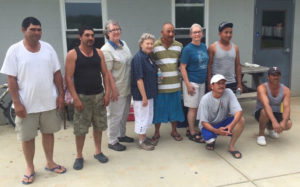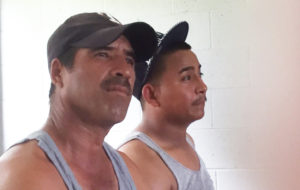 Our culture is heavy with the lure of material gain;
Our culture is heavy with the lure of material gain;
deliver us, O God, from the temptation to use others for our own profit.
— People’s Companion to the Breviary
Their fingerprints are on the food we consume: tomatoes, cucumbers, peppers, squash, sweet potatoes, watermelons, chiles, the Christmas trees that adorn our living rooms — and on the profits of the cigarette manufacturers in the United States. Huge profits. R.J. Reynolds is on record last year having a net income of $3.25 billion.
These men leave wives, children, parents, extended family and their communities to spend a minimum of seven months a year working in the U.S. guest worker program known as H2A. Would they rather work in Mexico? Yes. The economic reality is that they have the potential of earning in one day in the United States approximately the same amount they would earn in Mexico working one week.

A North Carolina migrant labor camp.
Notice, I said “potential.” The potential is there if contracts are honored, if visa and travel costs are reimbursed, if minimum work hours are compensated, if they remain in good health and able to work, and if no wage theft occurs. These are a lot of “ifs.” These workers are some of the most vulnerable employees in the nation when it comes to having the terms of their contracts honored. Who advocates for them? What authority do they have to question an employer? Or to insist they cannot work seven days a week? When criticized for stopping to drink water in the 90-degree heat, how do they respond without fear of recriminations?
My summers growing up on a North Carolina tobacco farm were sun-up to sun-down days spent in the field, only to return to the farmhouse to the women’s work of cooking, cleaning, laundry, canning and freezing. Our parents were the overseers of the work my brothers and I did. They worked alongside us knowing personally the necessity of water breaks, a few moments of respite in the shade and the hazards of the chemicals involved.

Guest workers in a labor camp in Angier, N.C.
Now growers rely on guest workers and undocumented workers to accomplish the same tasks we did as a family. Years ago neighbors would help neighbors harvest crops. Alongside families and neighbors assisting one another, there used to be tenant farmers. Prior to that, slavery.
Reading The Half Has Never Been Told by Edward E. Baptist has awakened me to the understanding of why there exists an expectation that there must always be laborers who will toil in our fields for slave wages. Historically, in the United States the wealthy have used the labor of unfree and vulnerable persons in order for a few to amass enormous profits which have kindled the fires of U.S. capitalism and made the country grow. This trickle-down economy is fond of quoting “the poor you will always have with you.” However, my morning offering from the Carmelite Sisters of Indianapolis intones: Our culture is heavy with the lure of material gain; deliver us, O God, from the temptation to use others for our own profit.
Since 2000 the Alliance of Baptists has partnered with the National Farmworker Ministry and the Farm Labor Organizing Committee (FLOC) to amplify voices for justice for farmworkers. It is time to change the structures of our society and economy to one where no laborer is taken advantage of, where workers voices are heard and valued, where history is transformed into God’s reign of justice and love.
Felipe, Jorge and Fernando have been toiling in tobacco and sweet potato fields multiple seasons seeking to earn enough money to return home and create a business, or buy the materials needed to construct a home for their families. Would you like to go meet them and hear their story? My hunch is, if you do, you’ll want to join me in the Alliance of Baptists, the National Farmworker Ministry and FLOC in addressing the living and working conditions of these without whom our grocery store shelves would be empty. Think about it the next time you enjoy a slice of watermelon!
